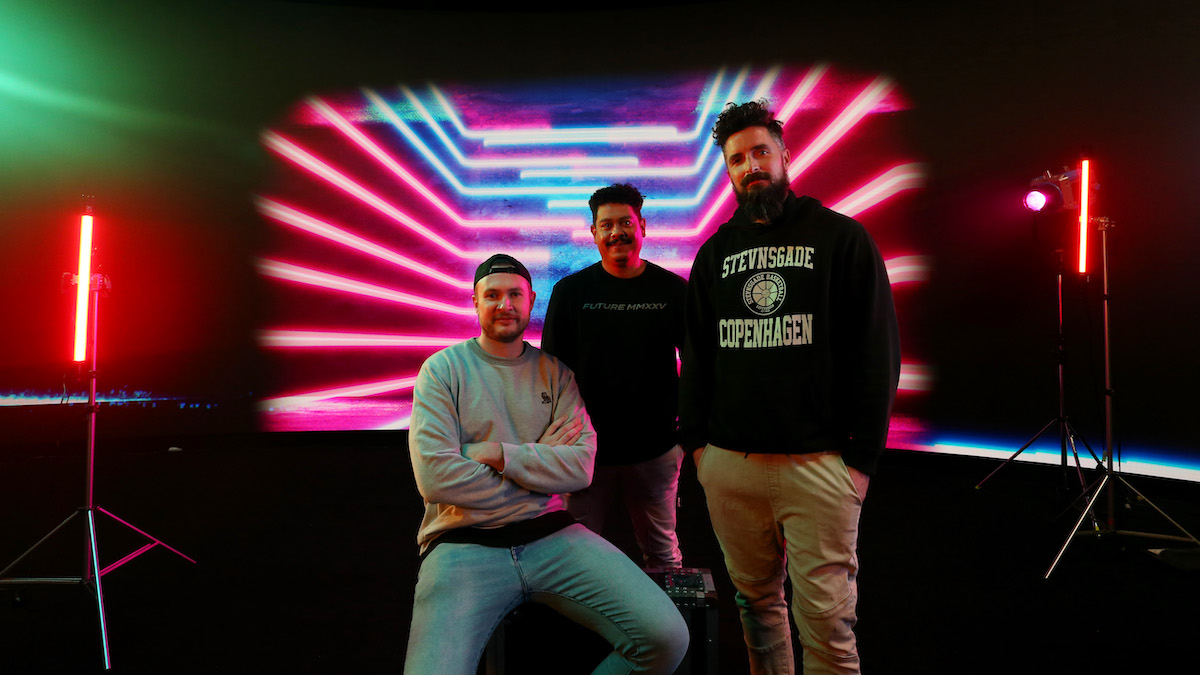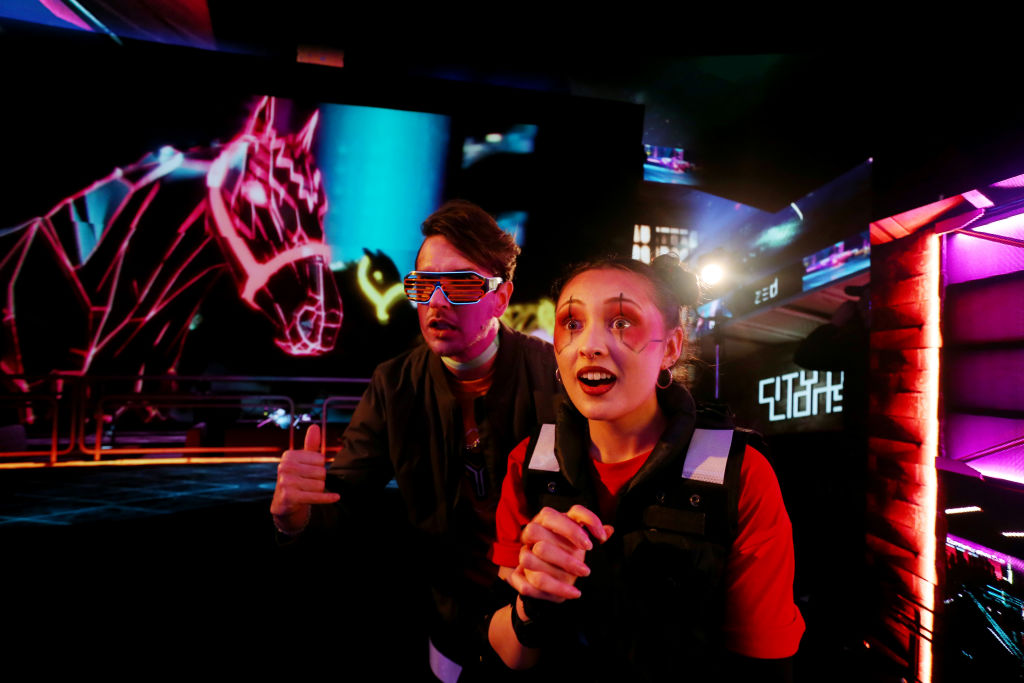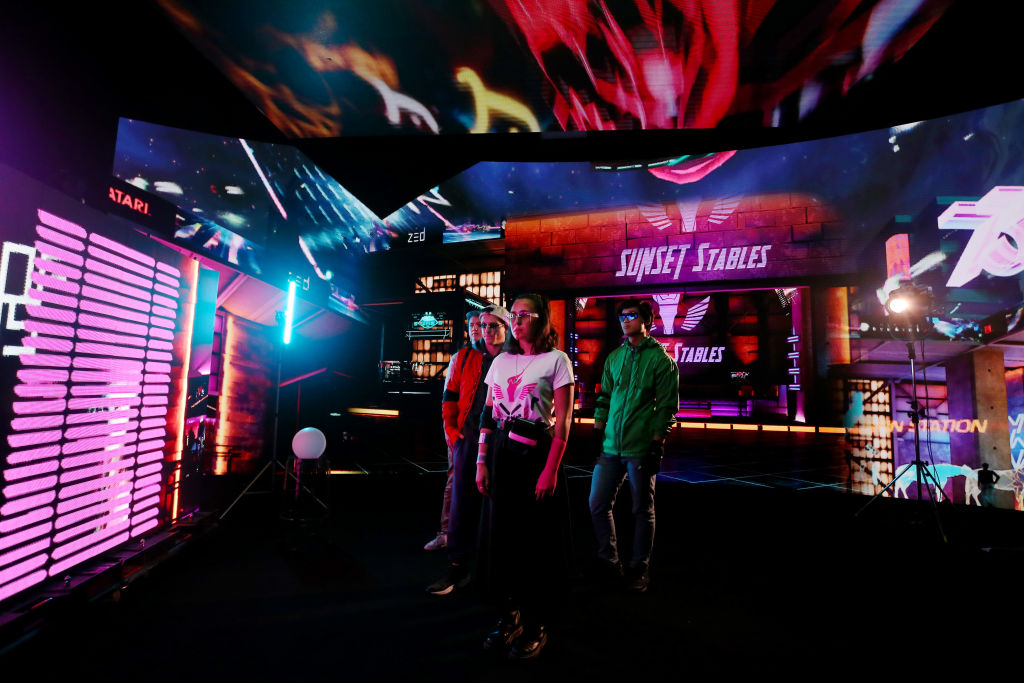Zed.Run racehorses selling for six figures, Sydney startup gets $27m in funding as crypto-powered gaming takes off

Virtually Human Studios' Geoff Wellman, Chris Laurent and Chris Ebeling (Lisa Maree Williams/Getty Images)
Zed.Run – a Sydney-founded crypto platform that involves racing, training and breeding virtual racehorses – has become a real-life hit.
Set in a dystopian planet a few decades in the future, Virtually Human Studio’s Zed.Run features horses in neon harnesses that exist as tradeable nonfungible tokens (NFTs) on Polygon, the Ethereum sidechain, and compete against one another in virtual races.
It’s one of several in a new genre of games that customers actually play to earn. Others include Sky Mavis’ Axie Infinity and The Sandbox, F1 Delta Time and Crazy Defense Heroes, created by former ASX-listed company and tech unicorn Animoca Brands.
Zed.Run racehorses have sold for as much as US$125,000 in Ethereum, with about $43 million in total sales. Opensea, the marketplace where the horses (and other NFTs) change hands, this week raised US$100 million at a US$1.5 billion valuation.
Virtually Human Studio last night announced it had raised US$20 million (A$27 million) in a Series A funding round led by TCG Capital Management, with Andreessen Horowitz and Red Beard Ventures also participating.
“What the team at Virtually Human Studio is building fundamentally alters what it means to be a fan. Fans are now empowered to come down from the bleachers, become owners themselves and play an active role in determining the outcome of the game,” said TCG vice president Jacob Smilovitz was quoted as saying in the announcement.
Dear friends, it’s official! Announcing our $20M+ USD Series A round, led by TCG, a16z and Red Beard, to accelerate our leading platform development in the NFT space.
Here’s to building the future of virtual entertainment!
Get the full scoop: https://t.co/TiMf60WMPT#ZEDRUN pic.twitter.com/03Qmua5ldt
— Virtually Human Studio (@V_H_Studio) July 21, 2021
Virtually Human Studio began this busy week by filming a television commercial for Zed.Run in the Sydney suburb of Alexandria that is set to air on platforms such as Twitch and TikTok, as well as possibly on traditional television in the United States.
The startup partnered with virtual reality production company Spectre Studios for the TV commercial, which was designed and filmed in Epic Games’ Unreal Engine, the 3D creation platform.

The company now has 50 staffers working remotely from every time zone around the world, up from 20 employees at the start of the year.
‘A revolution right in front of our eyes’
Chief executive Chris Laurent co-founded Virtually Human Studios three years ago, an endeavour that grew out of his work as a consultant to Newcastle wagering company Betmakers (ASX:TBH).
“I used to sit at a desk, horse racing on every screen, analyzing marketing and doing what we can to get the right kind of experience in front of the end-user … so that’s kind of how I got my taste for a horse racing game.”
At the same time, he was researching cryptocurrencies and the blockchain space.
“When I looked at it more deeply, I was just fascinated, I thought, wow, this is a revolution that is happening right in front of our eyes, and we need to capitalise on this,” Laurent told Stockhead.
When Vancouver-based Dapper Labs launched early NFT CryptoKitties in November 2017, Laurent and his then-business partner decided they could do them one better.
“I just connected the dots and said one thing that would be better than owning a cat would be a real racehorse,” Laurent said.
A simple landing page and a contract where people could buy the racehorses (which exist as tokens on the Ethereum blockchain), and almost immediately they were flying off the virtual shelves, Laurent says.
An “aha moment” was seeing the $50 virtual racehorses sell on secondary marketplaces for 10 or 20 times what the original buyer had paid, Laurent says.
“We just couldn’t ignore that … (so) it was like, well how do we create an ecosystem around this, especially for the community of the people involved and the people who are putting the trust in us to build a product.”
Today there are about 100,000 unique wallets connected to the Zed.Run ecosystem, and roughly 14,000 active users each day. That may not seem like a lot, Laurent says, but in the still-niche blockchain world, it’s “of magnitude.”
There are 1,600 user-driven races per day – compared to about 100 or 200 horseraces per day globally.
“So we’re able to outscale the market,” Laurent says.

A$43m in virtual horse sales
While some horses have sold for five figures, many were selling yesterday for around 0.1 to 0.5 Ether (A$257 to A$1,285).
Owning a horse then lets players pay $5 to $25 or so as an entry fee for a race, where they have the chance to split a 95 per cent of a pot of around $200 or so. Nearly US$10 million has been won.
Winners are determined by each racehorse’s unique assets and racetrack conditions. So there’s skill involved in learning about the horse and being tactical about what races to enter, Laurent says.
“We’ve got a number of stable owners who have given up their full-time jobs,” says VHS creative director Chris Ebeling.
Virtually Human Studio also announced this week it was partnering with Pony Run, a third-party NSW-based developer, to bring 2.5 billion in PlayChip ERC-20 (Ethereum) tokens in horseracing prize pools over a three-year period.
That many PLA tokens are currently worth about US$37.5 million, although of course, their value is in constant flux.
Horses can also sire more horses, which can then in turn be sold.
“You can breed a horse for maybe $100, to $500, and sell it for a $1,000, a day later,” Ebeling says.
“And if you have enough horses and a stable and enough good racers, and you’re strategic, you can map out a whole week’s salary – which easily could be like, $2,000 a week or something like that.”
Some good horses have won as much as $40,000, Ebeling says.
Overall, Zed.Run horses have sold for a total of 16,700 in Ethereum – about A$43 million.
Mike Tyson has even bought one.
No horsing around with this NFT purchase pic.twitter.com/tqpMC36uMQ
— Mike Tyson (@MikeTyson) July 13, 2021
Virtually Human even has an augmented reality app so they can see their horses on their smartphone.
“I’m really bullish on making people fall in love with their horses,” Ebeling says.
Recalling Tamagotchis, the digital pet craze of the 1990s, Ebeling says the next level of such creatures will be digital assets that people can visit in virtual reality, pat and feed and wash.
There are only a few thousand of the 38,000 Genesis horses left. Drops sell out within minutes and users can resell those virtual animals for tenfold what they paid for them, Laurent says.
Zed.Run moved to the Ethereum scaling solution Polygon (MATIC) about a year ago, to escape the high Ethereum that could result in races costing as much as $100.
While using Polygon has added complexity to Zed.Run, overall “it’s been a God bless for us,” Laurent says.
Possible token coming
Unlike nearly every other project in the crypto-space, Zed.Run doesn’t have its own token. Games like Axie Infinity have AXS and Small Love Potion tokens, and the Sandbox is powered by its SAND token.
“To be creating value for our users already with no baked economics into a token itself, is our edge,” Laurent says.
“The beauty for us is, we’re already giving our users as much value as we put things in the pipeline that will give them even more value.”
Virtually Human is looking at various staking models, and single and dual token models, Laurent says. But nothing definite has been decided.
Related Topics
UNLOCK INSIGHTS
Discover the untold stories of emerging ASX stocks.
Daily news and expert analysis, it's free to subscribe.
By proceeding, you confirm you understand that we handle personal information in accordance with our Privacy Policy.








